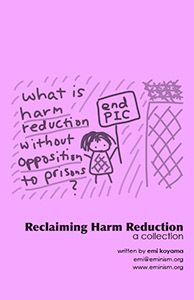Just in time for the 11th National Harm Reduction Conference next week, I am announcing the publication of my new zine, “Reclaiming Harm Reduction: a collection” which compiles my writings related to harm reduction philosophy (excluding my numerous writings on sex trafficking and sex trade, which have been published in other zines). The new zine is available for order from my new online store.

Here’s the introduction from the zine:
This booket/zine is a collection of my writings on the topic of harm reduction in my almost 20 years of activism.
Aside from the fact that I am presenting at the 11th National Harm Reduction Conference in San Diego next week (November 3-6, 2016) and wanted share my thoughts with people I meet there, I had a couple of reasons to compile some of my writings on this topic:
First, I live in Seattle area, where the phrase “harm reduction” has become a buzz word among people in the governemtn as well as in social service providers, which is welcome but its actual meaning is often lost in translation: many service providers use the term “harm reduction” when they simply mean that they don’t automatically exclude clients who are currently using drugs, but continue to have judgmental disdain for them or push a vision of “recovery” that does not reflect the needs or wishes of actual individuals who are coping with difficulties in their lives in the best way they know how.
Second, connected to the first point, I feel that harm reduction can be a lot more than just “a better way to deal with drug problems.” Drug use/abuse/addiction has not particularly been an issue that I deal with in my own personal life, but I encountered many of the similar failures of systemic responses to social problems, such as homelessness, violence against women, sex trafficking, and racism/classism/ableism/homophobia/transphobia/etc. In fact, harm reduction is the analysis that connects my involvement in various social justice movements, including advocacy of survivors of domestic and sexual violence, sex workers, intersex people, people with disabilities, and others. I wanted to compile a collection of my writings in these different movements to demonstrate a potential scope of harm reduction as a foundational philosophy and perspective.
That said, I also encountered limits of harm reduction, which I discuss in one of the essays included in this collection. While harm reduction helps us promote social interventions that meet the immediate needs of communities and individuals facing difficulties, it does not necessarily and automatically address the larger context of injustices in which these difficulties occur.
An example of this limitation that I address in the aforementioned essay is a suggestion that the distribution of condoms to U.S. military service members was a successful harm reduction program to reduce the spread of venereal diseases. While I agree such program may reduce the risk of venereal disease among U.S. soldiers, it does not address the violence of U.S. military interventions around the world itself, or the sexual violence too frequently perpetrated by the members of the U.S. forces against native women and girls. If anything, it might enable the U.S. to more efficiently and aggressively pursue military interventions across the globe that ultimately may result in more harms to the nations and peoples the U.S. decides to invade.
Harm reduction without an intentional commitment to the broader social and economic justice agenda can be reduced to a mere technology of population management. There are “harm reduction” housing programs in various cities where drug dealing and use are completely unregulated and unsupervised under the guise of “meeting where people are at,” where residents die from overdose every week without anyone outside of the building even taking a notice. Harm reduction should not be our communities’ excuse for being indifferent: while ultimately respecting how members of our communities choose to live, we cannot stop advocating for a better living environment for all of us, rather than simply pushing some of us aside in “harm reduction” ghettos and forget about them.
Essays collected in this booklet/zine span over 15 years of my writings, so some of the circumstances have changed since I wrote about them (I intentionally left out many writings that critiques the anti-trafficking movements because there are too many and I have compiled them into other booklets/zines). My thinking has also evolved in some of these areas as well. But overall, a commitment to harm reduction combined with social and economic justice continue to motivate my research and activism and it has only become more solidified if not sophisticated.
Thank you for picking up this collection, and I would like to hear what you think about them, or learn what else you are working on. Please feel free to contact me in any of the following ways:
Emi Koyama
PO Box 40570, Portland OR 97240
emi@eminism.org
www.eminism.org
Twitter: @emikoyama
Facebok: emigrl2
Table of contents:
- Toward a Harm Reduction Approach in Survivor Advocacy (Synopsis)
- Abuse of Power & Control within the Domestic Violence Shelter System
- One in 1,000 children may become subjected to growth attenuation (What Sorts of People–eugenics blog)
- Why I am Suspicious of Bioethics (Bioethics Forum)
- Joycelyn Elders (sort of) responds to intersex activist for the 1st time
- We need to abolish, not re-evaluate, domestic violence shelters
- Problem with “Gender Identity Disorder” Specialists
- Limits of Harm Reduction: “Managing” Sexual Assault is Not Enough
- The Uses of Negativity: Survival and Coping Strategies for Those of Us Who Are Exasperated by the Empty Promise of “It” Getting “Better”
- A thought on the first annual National Trans HIV Testing Day
- Next Steps for Safe Consumption/ Injection Site in Seattle, or why the City of Seattle should sell drugs and operate brothels
- Stop Calling Human Trafficking “Modern Day Slavery”

Leave a Reply